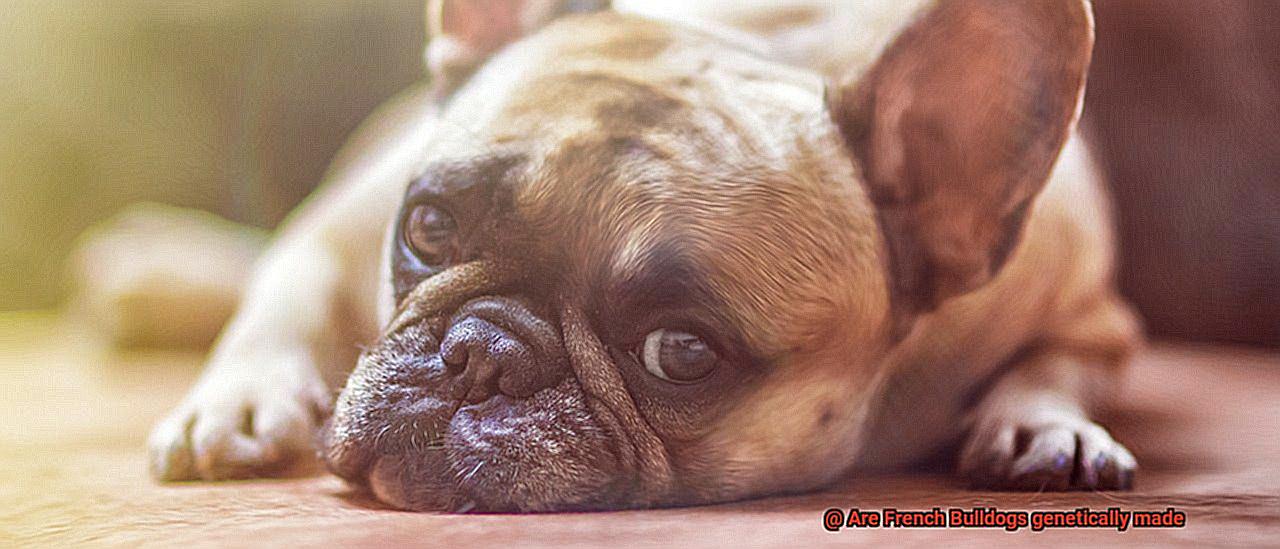Are French Bulldogs genetically made?
French Bulldogs have taken the dog world by storm, stealing hearts with their cute squished faces and mischievous personalities.
But here’s the burning question: are these little bundles of joy genetically made? Well, my friend, in this blog post, we’re about to embark on a journey through the fascinating realm of French Bulldog genetics.
Prepare yourself for a wild ride as we uncover the secrets behind their unique coat colors and distinctive body structure. Get ready to dive headfirst into the science behind these irresistibly adorable canines because things are about to get interesting.
So, grab a cup of coffee, snuggle up with your furry friend, and let’s unravel the genetic mysteries of French Bulldogs together.
Exploring the History of French Bulldogs
Contents
- 1 Exploring the History of French Bulldogs
- 2 Investigating the Genetics of French Bulldogs
- 3 Understanding the Brachycephalic Skull Shape of French Bulldogs
- 4 Examining Coat Colors in French Bulldogs
- 5 Assessing the Health Implications of Breeding Practices
- 6 Recognizing Ethical Concerns Regarding Breeding Practices
- 7 The Need for Responsible Breeding Practices
- 8 Educating Prospective Owners About Genetic Considerations
- 9 Conclusion

Get ready to embark on a journey through time as we explore the captivating history of our beloved breed. From its origins in England to its rise as one of the most popular breeds today, French Bulldogs have a story that is sure to leave you intrigued. So, grab your furry friend and let’s dive in.
A Journey from England to France:
In the 1800s, French Bulldogs were bred in England as a smaller version of the English Bulldog. However, it was their migration to France during the Industrial Revolution that truly shaped their destiny. Lace workers from Nottingham brought these charming dogs with them, and over time, the breed gained popularity in France. Thus, the Bouledogue Français or French Bulldog was born.
Genetic Makeup: The Frenchie Charm:
French Bulldogs possess a unique genetic makeup that sets them apart from other breeds. These genes determine their distinct physical features, including their stocky build, large bat-like ears, and adorable wrinkled face. While all dog breeds are genetically made to some extent, French Bulldogs are renowned for their brachycephalic skull shape, which gives them their signature flat face and pushed-in nose.
Coat Colors: A Beautiful Palette:
French Bulldogs come in a stunning array of coat colors, from fawn and brindle to cream and pied. This colorful variety is determined by specific genes responsible for pigmentation within their fur.
Responsible breeders carefully select mating pairs to produce desired coat colors while adhering to breed standards.
Ethical Considerations:

While we adore French Bulldogs for their unique appearance, it is important to acknowledge the potential health risks associated with certain genetic traits. Breeding practices focused solely on aesthetics can lead to health issues such as brachycephalic syndrome, breathing difficulties, and overheating.
Responsible breeders prioritize the health and welfare of their dogs and aim to strike a balance between desired traits and overall well-being.
Conclusion:
French Bulldogs have come a long way from their humble beginnings in England to becoming cherished companions worldwide. Their captivating history and genetic makeup make them truly one-of-a-kind.
As proud owners, let’s continue to celebrate these adorable pups while also educating ourselves about responsible breeding practices. Remember, a healthy and happy Frenchie is always the best companion.
Investigating the Genetics of French Bulldogs
Selective breeding practices have undoubtedly influenced the physical characteristics, coat colors, and health issues of French Bulldogs. Let’s take a closer look at how genetics have played a role in shaping these adorable and unique pups.
Physical Characteristics:
French Bulldogs are known for their brachycephalic (short-muzzled) face, which is a result of selective breeding for a specific skull shape. This distinctive feature gives them their charming and unmistakable appearance.
However, it’s important to note that this characteristic can also lead to respiratory issues and difficulty regulating body temperature. As responsible owners, it’s crucial to be aware of these potential health concerns and provide proper care and attention to our furry companions.
Coat Colors:
French Bulldogs come in a variety of coat colors, including fawn, brindle, pied, and cream. These coat colors are determined by specific genes that control pigmentation. Breeders must have a good understanding of these genetic factors to produce desired coat colors responsibly.
However, it’s essential to prioritize health over aesthetics when breeding French Bulldogs to avoid exacerbating potential health issues.
Genetic Health Issues:
Unfortunately, due to the breed’s small gene pool and selective breeding practices, certain genetic health issues have become more common in French Bulldogs. These include brachycephalic airway syndrome, hip dysplasia, allergies, skin conditions, and eye problems.

It’s crucial for breeders and owners alike to be aware of these potential health issues and take proactive steps to minimize their occurrence through responsible breeding practices.
Genetic Testing:
Genetic testing plays a significant role in understanding the genetics of French Bulldogs. Through DNA testing, breeders and owners can identify potential genetic health risks and make informed decisions in breeding programs.
Genetic testing can also provide insights into the ancestry and lineage of individual French Bulldogs, allowing breeders to maintain genetic diversity and reduce the risk of inherited diseases. It’s an invaluable tool in promoting the overall health and well-being of this beloved breed.
Understanding the Brachycephalic Skull Shape of French Bulldogs
French Bulldogs are known for their adorable and unique appearance, with their big ears, expressive eyes, and, of course, their brachycephalic skull shape. But what exactly does it mean to have a brachycephalic skull shape, and what implications does it have for the health of our furry friends?
In this article, we will dive deep into the world of French Bulldog skulls and explore the potential health issues associated with this distinctive feature.
What is a Brachycephalic Skull Shape?
The term “brachycephalic” refers to a shortened and widened skull shape, which is a defining characteristic of French Bulldogs and other brachycephalic breeds.
This unique skull shape is genetically determined and has been selectively bred for over many generations to achieve the desired appearance.
The Implications for Health
While the brachycephalic skull shape gives French Bulldogs their charming and distinct look, it also comes with its fair share of health concerns.
The shortened snout or muzzle, which is a prominent feature of the brachycephalic skull, can lead to various respiratory issues.
Breathing Difficulties
French Bulldogs with brachycephalic skulls often experience breathing difficulties due to their compromised airway. The shortened snout affects the anatomy of their respiratory system, leading to a reduced ability to breathe efficiently.
As a result, French Bulldogs may exhibit symptoms such as snoring, wheezing, and excessive panting. They may also struggle with exercise intolerance and have difficulty tolerating heat.
Dental Problems
In addition to respiratory issues, the brachycephalic skull shape can also affect the structure of the jaw and teeth in French Bulldogs. The shortened face can lead to dental problems such as overcrowding and misalignment. These dental issues can cause discomfort and may require professional intervention to correct.
Eye Problems
The flattened face of French Bulldogs can also contribute to eye problems. The shallow eye sockets and prominent eyes make them more susceptible to conditions such as proptosis, where the eyeball protrudes from its socket. They are also prone to corneal ulcers and dry eye. Regular eye examinations are essential to detect and treat any potential eye issues early on.
Heat Sensitivity
One of the most significant concerns for French Bulldogs with a brachycephalic skull shape is their increased sensitivity to heat.
Unlike breeds with longer snouts, French Bulldogs have a reduced ability to cool themselves through panting, which can put them at a higher risk of developing heatstroke.
It is crucial for owners to take extra precautions during hot weather and ensure their French Bulldogs have access to shade, water, and a cool environment.
Taking Care of Your French Bulldog
As responsible owners, it is crucial to be aware of the unique challenges associated with the brachycephalic skull shape of French Bulldogs. Here are some tips to help keep your furry friend healthy and happy:
Examining Coat Colors in French Bulldogs
French Bulldogs are known for their unique and eye-catching coat colors. From brindle to fawn, white to cream, and pied patterns, these dogs come in a variety of stunning hues. But have you ever wondered about the genetics behind these coat colors and how they affect offspring? Let’s dive into the complex world of coat color genetics in French Bulldogs.
The Main Gene: MC1R
One of the key players in determining coat color in French Bulldogs is the melanocortin-1 receptor (MC1R) gene. This gene has two primary alleles: E and e. The E allele produces black or dark-colored pigment, while the e allele produces red or yellow pigment.
The combination of these alleles determines the base color of a French Bulldog’s coat. A dog with two E alleles will have a black coat, while a dog with two e alleles will have a red coat.
Other Influencing Genes
In addition to the MC1R gene, other genes also influence coat color in French Bulldogs. The Agouti signaling protein (ASIP) gene controls the distribution of dark pigment on the body, while the K locus gene affects the intensity of pigmentation. These genes work in conjunction with the MC1R gene to create the unique coat colors and patterns we see in French Bulldogs.
Variability within Litters
It’s important to note that coat color can vary within a litter of French Bulldogs due to different combinations of inherited alleles from their parents. This variability adds to the charm and uniqueness of each individual puppy.
Breeding and Color Patterns
When breeding French Bulldogs, it’s crucial to consider the potential coat colors that offspring may inherit. Breeding two dogs with the pied gene, for example, can result in puppies with white coats and patches of another color. Understanding the genetics behind coat colors can help breeders make informed decisions and avoid undesirable health issues associated with certain color patterns.
Genetic Testing
To determine the potential coat colors a French Bulldog may carry and pass on to its offspring, genetic testing can be done. This testing provides valuable information for breeders and allows them to selectively breed for desired coat colors while ensuring the overall health and well-being of their dogs.

Assessing the Health Implications of Breeding Practices
French Bulldogs have become incredibly popular pets in recent years, but it’s important to understand the health implications associated with their breeding practices. In this article, we will delve into the potential health concerns that can arise from these breeding practices and offer insights on how to ensure the well-being of your French Bulldog.

Brachycephalic Syndrome:
One of the main health concerns in French Bulldogs is brachycephalic syndrome. This condition arises from intentionally breeding for a flat face, resulting in narrowed airways and respiratory difficulties. French Bulldogs with extreme brachycephalic features are more prone to heatstroke and other respiratory complications. To mitigate these risks, it’s essential to provide ample ventilation, avoid excessive exercise in hot weather, and ensure regular veterinary check-ups.
Genetic Disorders:
Selective breeding for specific traits in French Bulldogs has led to a decrease in genetic diversity within the breed. Consequently, they are more susceptible to various genetic disorders. Hip dysplasia, allergies, skin problems, eye disorders like cataracts and cherry eye, and spinal abnormalities are common health issues. Responsible breeders conduct thorough health testing to minimize these risks, so choosing a reputable breeder is crucial.
Musculoskeletal Issues:
Breeding practices that aim for exaggerated physical features can result in musculoskeletal problems for French Bulldogs. Their compact bodies and stocky build can lead to joint issues like patellar luxation and intervertebral disc disease. Regular exercise tailored to their needs and weight management can help prevent such problems.
Cardiac Problems:
The short stature and heavy build of French Bulldogs can strain their hearts, leading to cardiac problems. Responsible breeders prioritize the health of their dogs by conducting cardiac screenings and avoiding breeding dogs with known cardiac issues.
Choosing a Reputable Breeder:
To ensure the well-being of your French Bulldog, it’s crucial to choose a reputable breeder who prioritizes the health of their dogs. Ask about health testing, genetic diversity, and breed-related health concerns. Reputable breeders will provide appropriate documentation and information on the health history of their breeding dogs.
Recognizing Ethical Concerns Regarding Breeding Practices
French Bulldogs have become one of the trendiest dog breeds in recent years, thanks to their adorable looks and charming personalities. However, it is crucial to recognize the ethical concerns surrounding breeding practices for French Bulldogs. In this article, we will explore some of these concerns and shed light on the importance of responsible breeding.
- Irresponsible Breeding Techniques: One of the primary ethical concerns in French Bulldog breeding is the use of irresponsible breeding techniques. Some breeders prioritize physical characteristics like short snouts and compact bodies, leading to health issues such as respiratory problems, eye disorders, hip dysplasia, and skin allergies. Breeding solely for appearance without considering the potential health risks is a major concern.
- Overbreeding for Profit: With the surge in demand for French Bulldogs, some breeders prioritize quantity over quality. This can result in poor living conditions for both adult dogs and their puppies, including inadequate space, socialization, and veterinary care. Overbreeding can also contribute to the spread of genetic health issues within the breed.
- Breeding for Appearance Alone: Another ethical concern is breeding French Bulldogs solely for their appearance, neglecting their overall health and temperament. Breeders may prioritize exaggerated physical features that conform to breed standards set by kennel clubs and dog shows. This can lead to severe structural deformities or health issues that compromise a dog’s quality of life.
To address these ethical concerns, potential French Bulldog owners should be aware of the breeding practices behind the dogs they are considering. It is essential to do thorough research and select a responsible breeder that prioritizes the health and well-being of their dogs. Reputable breeders will conduct health screenings, provide proper care for their dogs, and prioritize temperament alongside appearance.
Additionally, adopting a French Bulldog from a rescue organization or shelter is another ethical option. There are many wonderful French Bulldogs in need of loving homes, and adopting can help reduce the demand for dogs from unethical breeders.
The Need for Responsible Breeding Practices
French Bulldogs are undeniably adorable and lovable pets, but their popularity has come at a cost. Irresponsible breeding practices have led to a myriad of health issues and genetic disorders within the breed. It is imperative that breeders prioritize the health and well-being of these dogs to ensure their long-term welfare.
Brachycephalic breeds like French Bulldogs have a distinct appearance with their short and flat skulls. However, this characteristic also brings a host of health problems. Breathing difficulties, overheating, and spinal issues are just a few of the challenges these dogs face. Unfortunately, some breeders prioritize appearance over the dog’s well-being, leading to severe consequences for these beloved pets.
One of the main concerns with French Bulldogs is the rise in hereditary diseases and congenital defects. This is a direct result of irresponsible breeding practices that disregard genetic health. Common issues include hip dysplasia, patellar luxation, allergies, skin problems, and eye conditions. These problems can cause pain, discomfort, and reduced quality of life for the dogs.
Responsible breeders understand the importance of thorough health screenings before breeding. They aim to eliminate any genetic disorders or diseases that could be passed on to future generations. Tests for common health problems like hip and elbow dysplasia, cardiac issues, and eye abnormalities are conducted to ensure healthier puppies.
In addition to health screenings, responsible breeders also focus on genetic diversity. Inbreeding and line-breeding practices increase the risk of inheriting harmful genetic traits. By introducing unrelated individuals into their breeding program, breeders can reduce the chances of passing on these detrimental traits. This helps promote a healthier gene pool and reduces the prevalence of genetic disorders.
Temperament and behavior are also crucial considerations for responsible breeders. They carefully select breeding pairs with stable personalities, good temperaments, and sound behavior to ensure that future generations maintain these desirable traits. This helps create well-rounded and emotionally stable French Bulldogs that make excellent family pets.
Proper care is a fundamental aspect of responsible breeding practices. Breeders provide their dogs with a healthy diet, regular exercise, veterinary care, socialization, and a comfortable living environment. This comprehensive approach ensures the overall well-being of the dogs and contributes to the production of healthier and happier French Bulldogs.
However, responsible breeding practices are not solely the responsibility of breeders. Prospective owners of French Bulldogs must also play their part by supporting ethical breeders. By choosing a puppy from a reputable breeder, potential owners actively promote responsible breeding practices and contribute to the long-term health and well-being of the breed.
Educating Prospective Owners About Genetic Considerations
You’ve fallen in love with those big puppy eyes and adorable squishy face of a French Bulldog, huh? Can’t blame you. They are the epitome of cuteness. But before you bring one of these little bundles of joy into your home, it’s crucial to understand the genetic considerations that come along with owning a French Bulldog.
It’s not all rainbows and sunshine, but with the right knowledge and responsible choices, you can ensure a happy and healthy life for your furry friend.
Brachycephalic Breathing Blues
Let’s start with the elephant in the room – or should I say, the short-nosed dog in the room? French Bulldogs are known for their brachycephalic nature, meaning they have a cute little snub-nose. While it may look adorable, it can lead to some serious breathing difficulties. Picture yourself trying to catch your breath after running a marathon while carrying a suitcase full of bricks – not fun, right?
Well, that’s how it feels for our French Bulldog friends. Their pushed-in face can cause snoring, wheezing, and even difficulty regulating their body temperature. So, if you’re considering bringing a French Bulldog into your life, be prepared for some extra TLC when it comes to their respiratory health.
Hereditary Health Hazards
Now, let’s dive into the world of genetics. French Bulldogs are prone to some hereditary diseases that you need to be aware of. These little guys are more susceptible to conditions like hip dysplasia (ouch.), patellar luxation (a fancy way of saying their kneecaps may pop out of place), and intervertebral disc disease (ouch again.).
It’s important to understand that these genetic predispositions can have a significant impact on your pup’s quality of life. Imagine your French Bulldog struggling to walk or experiencing excruciating pain – not the picture-perfect image you had in mind, right? By educating yourself about these potential health issues, you can provide the best care and seek timely veterinary intervention when needed.
The Responsible Breeder Factor
Now, here’s where responsible breeders come into play – they’re like the superheroes of the dog world. These dedicated individuals conduct health screenings of their breeding dogs to minimize the risk of passing on hereditary diseases to future generations. Talk about going the extra mile.
When you’re searching for your perfect French Bulldog pup, make sure to ask breeders for health clearances and proper documentation. This way, you can rest assured knowing that your furry friend is coming from healthy parents. And hey, while we’re at it, let’s give a big thumbs down to backyard breeders and puppy mills. These places prioritize profit over the well-being of their dogs and contribute to the perpetuation of genetic issues. Remember, supporting responsible breeders is key.
eh8aQ982Vyw” >
Conclusion
In conclusion, French Bulldogs are indeed genetically made. Through a process of selective breeding, humans have intentionally manipulated their genetic makeup to create the distinct characteristics that we associate with this breed. From their unique appearance to their specific health issues, every aspect of a French Bulldog’s genetic composition has been carefully crafted by humans.
But let’s not forget the ethical implications of this genetic manipulation. While it may be fascinating to witness the creation of a breed with such distinctive traits, it raises questions about the well-being and quality of life for these dogs. Breeding for certain physical features often comes at the expense of their overall health and can lead to a myriad of medical problems.
Furthermore, the popularity of French Bulldogs has skyrocketed in recent years, leading to an increase in irresponsible breeding practices and puppy mills. These unethical practices prioritize profit over the welfare of the dogs, further exacerbating the health issues that already plague this breed.
It is essential for potential owners and enthusiasts alike to educate themselves about these concerns before bringing a French Bulldog into their lives. Responsible breeding practices and proper care can help mitigate some of the health problems associated with this breed.
In conclusion, while French Bulldogs may be genetically made, it is crucial to approach their breeding and ownership with caution and responsibility.




